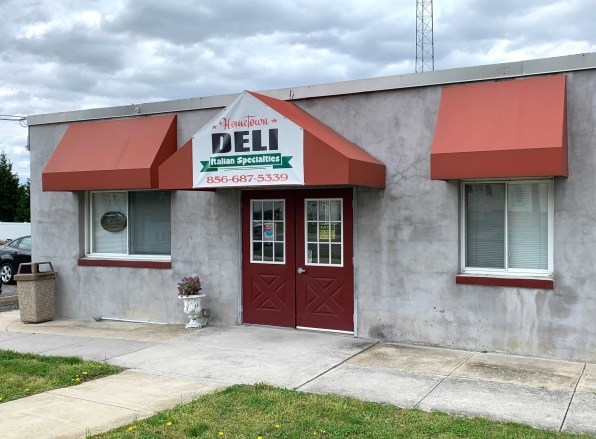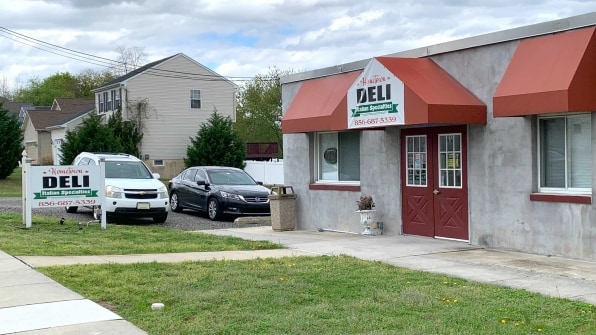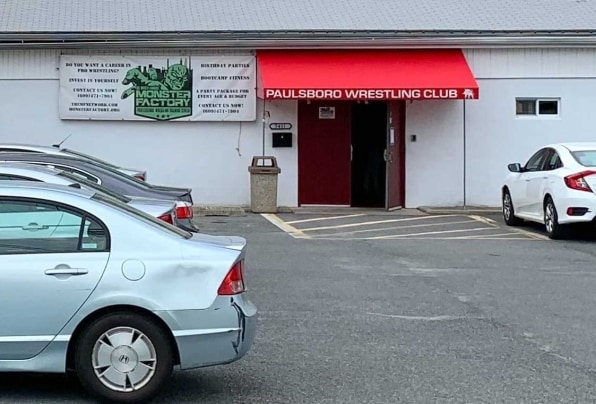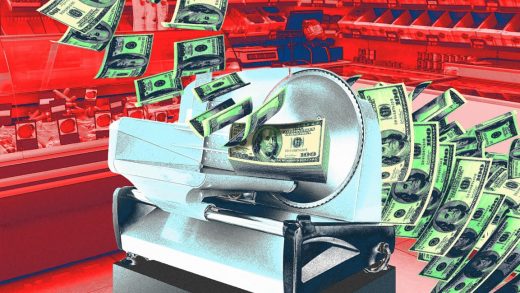“Whatever it is, it’s not very good”: The strange, incredible case of the $100 million deli
Partway down a residential street in Paulsboro, New Jersey, a working-class town best known for its high school wrestling team, is a seemingly unremarkable deli. Out front, a green, white, and red sign advertises “Italian Specialties.” Inside, according to the menu, you can get a $6 burger or a grilled ham and cheese for $5.25.
But Your Hometown Deli isn’t like other South Jersey hoagie joints. As the locals recently learned, the deli is the sole venture of a publicly traded company, Hometown International, whose investors include a shadowy cabal of financial entities in China—in addition to some of their Paulsboro neighbors. The deli, as of today, is valued at more than $100 million.
Hometown’s eye-popping market cap can’t be explained by its sales. The deli’s revenue, never spectacular, has fallen each of the last four years, from a high of $76,213 in 2016 to $13,976 last year, when it closed for several months because of the pandemic. Yet even those numbers sound generous.
“I’ve never been there,” said Tina Kauffman, who lives two doors down. “I’ve lived here five years, and it’s never open.”
“I’ve come here seven, eight times,” added Paulsboro resident Ken Snyder. “Only one time it was open. But they said the cook was out.”
On a recent Saturday, at an hour when the deli’s Facebook page said it would be open, the doors were locked. A woman inside said it was closed for a “private event.” She declined to say when the deli would be open next or how to contact the owners.
Many neighbors living within a few blocks of the deli refused to talk about it at all. A man raking stones in his yard told me he had never been to the deli, but declined to give his name because “I don’t want someone throwing blocks through my windows.”

The $100 million deli has been the talk of Wall Street since mid-April, when hedge fund billionaire David Einhorn cited Hometown as evidence of “quasi-anarchy” in financial markets and the impotence of industry regulators. Subsequent reporting revealed that Hometown had taken $2.5 million from a series of Hong Kong firms, then spent hundreds of thousands of dollars on consultants with no obvious result. While Hometown claimed in legal filings that it was looking for a company to acquire, perhaps to expand its “new ‘Delicatessen’ concept,” no merger target could be identified. On Wednesday, the over-the-counter market where Hometown traded warned investors that it appeared the company was “not complying with the rules.”
But even as everyone seemed to agree there was something fishy going on, no one could say just what it was. Was this a Jersey version of the recent SPAC craze, in which investors form a blank-check company to take a private business public? Could it be some sort of money laundering scheme? Or perhaps another GameStop, a meme stock whose rise defies rationality?
I pored over Hometown’s legal filings, then headed down the Jersey Turnpike to try to find out.
THE WRESTLING COACH
Paulsboro is not an obvious home for a $100 million company. The small town, across the Delaware River from Philadelphia’s airport, is dominated by oil tanks and the smokestacks of one of the biggest refineries on the East Coast, which recently laid off hundreds of people amid a drop in gas consumption during the pandemic. Its 6,000 residents have a per capita income of $27,000.
“It’s a blue-collar, working-class, two-square-mile town nestled between two oil refineries,” said John Burzichelli, who was mayor for 16 years and represents the area in the state Assembly.
Paulsboro, until news of the deli broke, was best known for its wrestling: The high school’s Red Raiders have won the state wrestling championship in 33 of the last 38 years. Right next door to Hometown Deli is Monster Factory, a famous professional wrestling school. “It’s in the water. You’ve got to wrestle if you live in this town,” explained a local resident who unsuccessfully tried to enter the deli recently after seeing it in the news.
No surprise then that Paul Morina, the high school principal and wrestling coach, is a celebrity around Paulsboro. With more than 700 career wins, 45 losses, and 30 state titles, he was hailed in The Philadelphia Inquirer as one of the most “successful coaches in South Jersey history, in any sport.” He spent six years on the borough council, and his brother is the county sheriff.
“The Morinas are big in Paulsboro,” said Wendy Leadbeater, who lives nearby. “I’ve known Paul all my life. He’s like a Paulsboro hero.”
Coach Morina is also the president of Hometown and has been since the company’s inception in 2014, which is likely one of the reasons so few locals want to discuss it. According to public filings, Morina’s stake in the company is worth nearly $20 million. The deli’s vice president, Christine Lindenmuth, is identified as a math teacher at the same high school. (Neither Morina nor Lindenmuth responded to repeated requests for comment.)
Morina’s involvement might have continued to fly under the radar if not for a series of big-money moves that ultimately vaulted Hometown into the media spotlight. On the last day of 2019, he and Lindenmuth each sold 1,000,000 Hometown shares to a mysterious investor named Peter Coker Jr., who simultaneously loaned the company $185,000. A month and a half later, Coker was named chairman, catapulting over Morina and Lindenmuth. Since then, the stock has risen more than 500%. The company is now worth 4,500 times its pre-pandemic revenue of $21,772 from 2019.
Hometown’s public documents say that Morina and Lindenmuth—who receive no pay—now spend “very limited time” on the company’s affairs. The company reported no full-time employees in 2020, and it spent just $126 on labor that year, which equates to a little more than 12 hours of work at New Jersey’s minimum wage, as Matt Levine noted in Bloomberg. It’s not clear who actually staffs the cash register when the deli is open.
The person at the register probably isn’t Coker: He’s a Hong Kong-based businessman and chairman of South Shore Holdings Limited, an engineering, construction, and hotel operator with concerns in Hong Kong, Macau, and mainland China. With those connections, Coker may be the link between the deli company and a raft of new investors. About two months after he became chairman, three Hong Kong firms controlled by the investor Manoj Jain, a former managing director at the infamous hedge fund Och-Ziff, bought $2.5 million worth of shares at $1 apiece. A series of Macau-based companies, all with the same street address, also took on millions of shares. One of those Macau companies signed a consulting agreement with Hometown last year. Hometown now pays VCH Limited $25,000 a month for help building “a presence with high net worth and institutional investors.”
With Coker as chairman, Hometown became something of a family business. His father, Peter Coker Sr., already owned tens of thousands of shares, both individually and through an investment firm he controlled. The elder Coker had been involved in the deli company since its inception. Soon after it was incorporated, Hometown started paying consulting fees to a firm Coker co-owns, Tryon Capital Ventures. From 2014 until 2016, it paid Tryon $8,000 a month for “administrative and other miscellaneous services.” Last year, months after the younger Coker became chairman, Hometown signed a new agreement with Tryon, one of its two ongoing consulting contracts. Now it pays Tryon $15,000 a month for “support in the research, development, and analysis of product, financial and strategic matters.” The contract gives no more details about what that might mean. (Neither of the Cokers responded to calls or emails seeking comment. Shortly after this story was published, Hometown International announced that it has terminated its consulting agreement with Tryon “in light of the recent press.”)
The Tryon Capital associates are a motley crew, with Coker Sr. and others at Tryon having faced a series of legal problems dating back to the early 1990s. As CNBC first reported, Coker was accused of trying to hide money from creditors and faced accusations of fraud in a civil lawsuit. (He denied the claims.) In 1992, he was charged with prostitution, corruption of minors, and open lewdness after he allegedly exposed himself to three girls, ages 10 through 15, according to The Morning Call of Allentown, although there is no record that he was convicted. Tryon co-owner Peter Reichard was convicted of a felony in 2011 after illegally funneling money to a North Carolina governor’s campaign by disguising it as a consulting arrangement with Tryon. (Reichard did not respond to requests for comment.)
Why Coach Morina got mixed up with the Cokers remains unclear, although a wrestling world connection may provide a clue. When Lindenmuth signed a lease for the deli’s space in 2014, the man who signed on behalf of the landlord was a Tryon employee, James Patten, who had attended Paulsboro High School at the same time as Morina. The two men were on the wrestling team together and remain friends on Facebook; Patten occasionally posts about the Red Raiders and shared at least one photo of himself with Morina.
Morina and Patten took different paths after graduating together in 1977. Morina went on to be a star athlete at James Madison University before becoming a coach; Patten began a career as a stockbroker and later expanded into other financial services. He has also repeatedly gotten in trouble with financial regulators—according to a database maintained by FINRA (the Financial Industry Regulatory Authority), Patten has been fined or sanctioned at least a half-dozen times and is currently barred from acting as a broker or associating with broker-dealers. (Patten did not respond to requests for comment.) At some point, at least as early as 2014, the former classmates became business partners.

A “SHELL FACTORY”
The whiff of scandal surrounding Tryon Capital doesn’t necessarily have any bearing on the Hometown Deli mystery. But the legal affairs of Gregg Jaclin may help to shed some light. Jaclin, a former lawyer who was involved in the deli company’s early public filings, was indicted by federal prosecutors in 2017 on eight counts related to what the Securities and Exchange Commission described as a “shell factory.” The SEC said that he and an associate set up a series of publicly traded shell companies that they dressed up to look like legitimate businesses, then merged with real companies that wanted to go public.
Understanding Jaclin’s scheme requires some background explanation, because publicly traded shell companies are strange entities. They have stock and shareholders, but no significant assets or business activities. Sometimes they’re the remnants of a failed company—a zombie business whose corporate husk lives on. Other times, shells are created that way from the start: They’re useful, and potentially profitable, because they can help a private company go public without having to deal with the expense or scrutiny that comes with an IPO. The shell and the private company will merge, and the newly public company, now with real business activity, will be able to raise money by issuing additional stock.
But companies that are created as shells from the start face numerous restrictions, many of them aimed at curbing money laundering. The money they bring in from stock sales has to be held in escrow, not touched until the shell merges with a private company. The shareholders can’t sell their shares until the merger is done. The shell has an 18-month time limit to find a company to merge with and must file detailed public disclosures within days of any merger taking place.
It’s “easier and better to merge with an operating business than a shell,” said David Feldman, a corporate and securities lawyer at the firm Hiller, PC. That’s why some bad actors use operating businesses to commit fraud. Feldman gave the example of a small yoga studio, not making much money, that decides to go public. That’s fine, legally speaking. But if the owners don’t tell the public their real plan is to find a merger partner and shut down the yoga studio? “That’s fraud,” Feldman explained. “Everybody who buys the stock of that company is misled about what its real business is.”
Jaclin’s scheme was a bit more brazen. As the SEC described it, his accomplice would create a fake business plan and convince someone to act as a “puppet CEO” of a company that Jaclin would incorporate in Nevada. The company would look real on paper, but it was just a shell—it wasn’t doing any actual business. They would then arrange for about 35 “straw shareholders” to hold shares in the company so that it wouldn’t look like it was controlled by a single person. Finally, they would find a private company that wanted to go public but didn’t want the expense or scrutiny that comes with an IPO. This private company would merge with the shell by buying the shell’s shares, and the money it paid would flow back to Jaclin and his accomplice.
Jaclin was convicted of conspiracy and obstruction of justice, agreed to an order in a related civil case that barred him from appearing before the SEC, and was disbarred. He did not respond to requests for comment.
In some ways, Hometown Deli recalls the fake companies that Jaclin created. Hometown was incorporated in Nevada and doesn’t do much in the way of sales. Its business plan trumpeting a “new ‘Delicatessen concept’” sounds barely thought out. For most of its existence, it had between 34 and 36 shareholders. Morina, the wrestling coach with no apparent business experience, fits the profile of a puppet CEO.
Indeed, the SEC has repeatedly questioned whether Hometown is a shell company in disguise. In multiple letters from 2015, the SEC instructed Hometown to revise its filings “to state that you are a shell company, as it appears from your disclosure that you have nominal operations and assets.” Last year, the SEC demanded to know “why you should not be considered a shell company.”
Each time, Hometown was apparently able to convince the SEC that it wasn’t a shell. And there are reasons to think it wasn’t one of Jaclin’s fake businesses. His indictment said that the scheme ended in 2013, about six months before the deli was incorporated. And if the deli were part of the same scheme, it’s not clear why the other people involved would have continued the ruse after Jaclin was indicted, or why the Hong Kong investors would have poured $2.5 million into it last year.
Matthew McMurdo, a lawyer who handled a filing for Hometown after Jaclin got into trouble, said he asked for confirmation from Jaclin that the company wasn’t a fraud. Hometown “definitely was not” one of the fake companies Jaclin set up, McMurdo claimed. “This was a completely different type of company, with actual revenue and with an actual storefront, albeit a small one.” (Hometown’s current lawyers, at the Crone Law Group, did not respond to requests for comment.)
And McMurdo is right: The deli does make some sales. Burzichelli, the state assemblyman, said he got an Italian hoagie there just before I called him. On that recent Saturday when it was closed for a private event, several men walking out of the Monster Factory, the wrestling training center next door, tried to go in to buy food. One said that whenever he visits the training center from his home in Connecticut, the deli is his go-to spot.
But most people who live nearby had either never been there or refused to discuss it. As I drove around Paulsboro, trying to find someone to talk about Hometown Deli induced an unexpected sense of foreboding. Leadbeater, the neighbor who described Morina as a “Paulsboro hero,” warned me to be careful reporting this story because I “look like just a little guy.” (I’m 6-foot-2, but admittedly I was dwarfed by some of the wrestlers coming out of the Monster Factory.)

Experts I spoke to mostly agreed that something is wrong with the deli and its valuation. But the answer doesn’t appear to be as simple as Jaclin’s scheme.
“These guys are burning cash at the rate of 70 grand a month with no sales, and they’re burning all that cash in consulting deals with related parties. So whatever it is, it’s not very good,” said Matteo Gatti, a professor at Rutgers Law School. “The question is whether all of the current investors know what’s going on and are on board with what’s going on, or if some of them are being defrauded.”
Richard Cazier, who studies financial reporting and securities litigation at the University of North Texas, posited the deli might be another “shell factory” type scheme, but that other factors likely played a part in Hometown’s soaring stock. Its shares were not frequently traded in the years when they rose to their current, stratospheric heights, and they received basically no scrutiny (until recently) from market regulators, institutional investors, or any other outsiders. “So basically, this looks like a combination of misconduct, poor governance, lack of disclosure, lack of oversight, and lack of sophisticated investors,” he said.
That brings us back to David Einhorn’s complaint about “quasi-anarchy” and the irrationality of markets. Hometown’s share price rose steadily from $1.50 at the end of 2019 until it plateaued around $13.90 a share earlier this year, for no discernible reason, giving the company a market capitalization of more than $100 million. Perhaps, suggested Tony Loviscek, chair of the Department of Finance at Seton Hall University, Hometown was buoyed by the same sort of penny-stock gamblers who sent GameStop to the moon. “They’re invoking Disney’s first law: Wishing will make it so.”
A WEB OF EMPTY COMPANIES
In a final attempt to unravel the mystery of Hometown’s purpose, I uncovered several other companies with murky ties to the Paulsboro deli and its global network of investors.
Among the more interesting entities in Hometown’s orbit is Med Spa Vacations, an “early-stage company” that was incorporated in Nevada in 2015 to sell health and wellness vacations. It never made much money, and it eventually closed its operations. Now it acknowledges in its public disclosures that it’s a shell company looking to acquire a private business. It signed a lease earlier this year with Tryon Capital, the same company that Hometown pays $15,000 a month and that’s owned by Peter Coker Sr., father of Hometown’s chairman.
Med Spa pays Tryon consulting fees, too, although only a few thousand each month. Where does it get the cash? Two months ago, it received a $150,000 loan—from Hometown International.
As I pulled at these strings, more patterns emerged. Med Spa’s president, John Rollo, who was until recently a patient transporter at a New Jersey hospital, is also the CEO of E-waste Corp., a failed electronic-waste recycling company that is now a shell company looking for another business to acquire. Like Med Spa, E-waste Corp. has been paying Tryon thousands of dollars a month for consulting and received a $150,000 loan from Hometown late last year, shortly after the deli reopened from its pandemic-induced closure. (Shortly after this story was published, E-waste Corp. said that it had terminated its consulting agreement with Tryon Capital.)
E-waste’s stock price, like Hometown’s, has risen, and the company is now worth about $85 million. E-waste announced earlier this month that it sold 2.5 million shares to three investors, who paid $1 a share. It didn’t name the investors, but the deal mirrors the 2.5 million shares that three Hong Kong entities bought from Hometown last year.
Another company pops up if you follow the trail of Hometown’s former secretary, Beth Floyd, who was with the company from its founding until she left last year. For some of that time, she was also secretary for a cigar wholesaler called Tabacalera Ysidron. The cigar company shared the same North Carolina address as a firm controlled by Coker, and it paid the firm $5,000 a month for consulting, even though it never brought in more than a few hundred dollars in revenue. Eventually its business failed, it became a shell company, and then it merged with a biotech startup in 2016. The company later merged again, this time with an oil-field-services company.
Could Tabacalera Ysidron’s success be the model for Hometown and other shell companies? If so, it would hardly be the first case of private equity rooting for a public company to fail. Nor is Tryon dissimilar from those practitioners of high finance who lure retail investors into SPACs. “How is this any different from venture capital today?,” wondered Elven Riley, an instructor in Seton Hall’s Department of Finance. “If they hit 1 in 5, or 1 in 10, that’s how they fund their business. So maybe Tryon just keeps on getting involved with these little companies, and if they hit 1 in 20, they succeed.”
Coach Morina, the Cokers, and the other people involved aren’t talking publicly. The SEC did not respond to questions about whether it is looking into the situation. For now, onlookers are still divided about what’s going on and why.
John Burzichelli, the New Jersey assemblyman and former Paulsboro mayor, was left shrugging his shoulders. “Any small town, when you find out your local deli’s worth a hundred million dollars, that’s going to draw some attention.”
Michael Linhorst is a writer, media lawyer at Yale Law School, and former New Jersey State House reporter for The Record.
(29)



